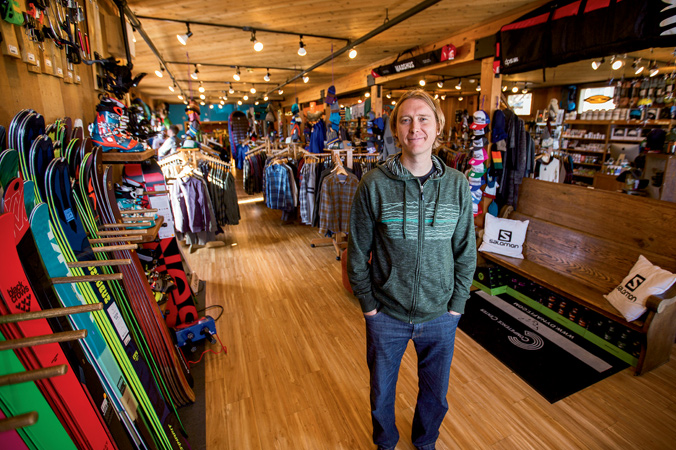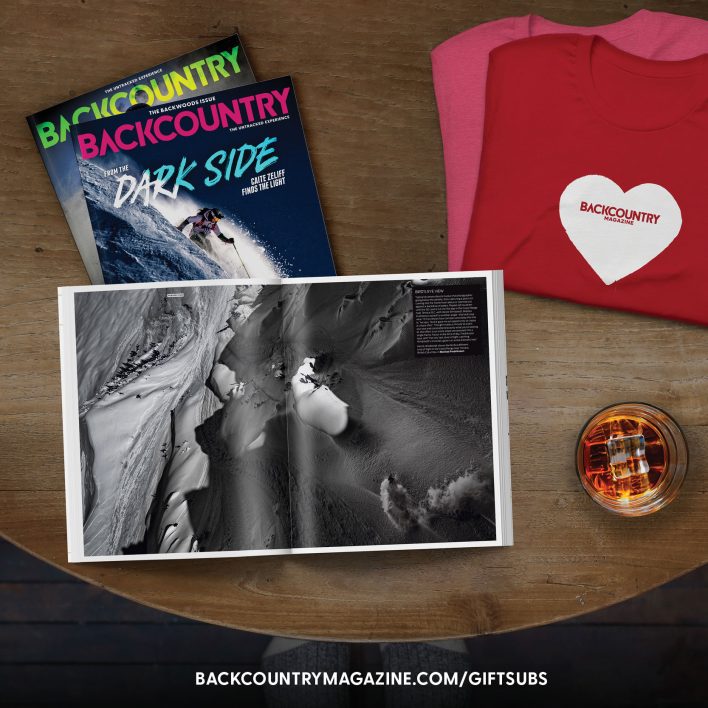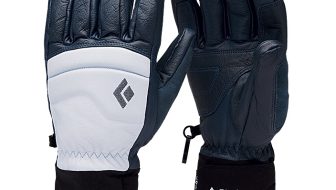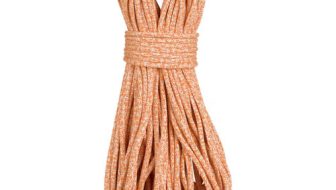
Brendan Madigan in his mountain shop, Alpenglow Sports, which has been skier owned and operated in Truckee, Calif. for more than 35 years. [Photo] Scott Rokis
“Should I be worried?” Volken asked Jewell. She replied that these things typically go one of two ways: businesses will either thrive because of REI’s presence or they won’t, and there often isn’t a lot of room in between. And, for Volken, those words were pretty prophetic. “I thought this was the recipe for success for specialty retailers,” he says. “You need a crystalized identity, which is something a box retailer is always trying to foster but is really difficult for them to do.”
“I love mountain stuff, I love skiing and I refused to branch out into anything else,” says Volken, an internationally certified mountain guide whose store recently celebrated 25 years in business. “That ultimately became part of the brand of the store; that’s probably why the store survived and is thriving now.” But is a beloved identity enough to combat increasing pressure? Even boutique ski brands that once relied heavily on partnerships with small shops are rethinking strategy.
Take Trew Gear. Two years back, the Hood River, Oregon-based outerwear brand announced their transition to a direct-to-consumer model, where shoppers can only buy directly from the company—not shops locally owned or otherwise. It’s a tactic they employed to stay both relevant and afloat in a competitive market. And Trew cofounder Tripp Frey is enthusiastic about the switch.
“When we were selling through brick-and-mortar retail, a jacket might cost us $100 to make,” he says. “We would sell it to the store for $200, and they might sell it to a consumer for $400.” But by selling direct, Frey says, the company can offer the same product at more competitive prices.
Online-first isn’t a tactic just limited to individual brands. In Aspen, 8K Peak Technologies, which specializes in ski-mountaineering equipment, is mainly focused on its online presence, even as they partner with a locally owned Aspen shop, Performance Ski, and run an AT-specific demo center.
8K Peak cofounder Mike Marolt admits that competing with large, online retailers is tough. “When you’re starting out, you can’t rely on Internet marketing,” he says. “How can small companies like 8K Peaks compete with backcountry.com?” The answer, Marolt believes, lies in sharing he and his brother’s story and credentials as pioneers in high-altitude skiing. “We decided to throw the spaghetti at the wall and leverage our story, self-promote,” Marolt says. It paid off: in just two years, 8K Peak Technologies has become the largest retailer of Fischer AT gear in North America. Volken’s utilized that method, too, relying on his influence as one of the country’s first internationally certified guides to solidify his consumer base.
And it seems, despite the odds and thanks to a handful of new strategies, niche brick-and-mortar shops are here to stay. Volken, at least, maintains that positive outlook. “Skiing is a soulful sport, and skiers are soulful people,” he says. “I feel like people are looking for human and social interaction.” For the mom-and-pop, the future of locally owned shops may lie in maintaining a community hub for skiers, riders and mountaineers to rally around.










Where is this REI in North Bend you speak of? If there is one in North Bend, it is hiding really good.
Which is fine by me, because Martin’s Pro Ski and Mountain Service is great. Highly encourage people to check it out when in North Bend.